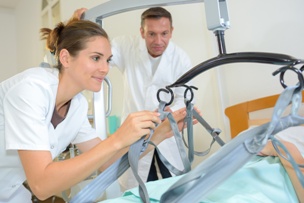 Many nursing home residents are unable to move themselves. They can’t get out of bed without significant assistance from nursing home staff members. However, it can be difficult or even dangerous for nursing home staff members to move residents without assistive devices.
Many nursing home residents are unable to move themselves. They can’t get out of bed without significant assistance from nursing home staff members. However, it can be difficult or even dangerous for nursing home staff members to move residents without assistive devices.
Hoyer Lifts Can Help Nursing Home Staff Move Residents
Hoyer lifts are portable devices that can be moved from room to room to help residents. When it is used safely, a Hoyer lift can assist nursing home staff in moving residents to a nearby chair, bed, or bathroom. The staff member using the Hoyer lift should secure the resident into the sling seat of the lift and carefully move the sling to the desired location. The Hoyer device does the heavy lifting thereby reducing the physical strain and risks of injury to the staff member.
Hoyer Lift Accidents Can Result in Significant Injuries
Hoyer lifts are useful tools when they are used correctly. However, they can be dangerous when nursing home staff fail to exercise reasonable care. While some injuries involving Hoyer lifts are accidents, other injuries are the result of nursing home neglect. If a Hoyer lift injury occurs for one of the following reasons, it could be the result of nursing home neglect:
- Lack of training. Staff members who use Hoyer lifts must receive adequate training in how to use them safely. If a staff member who has insufficient training or no training at all attempts to use a Hoyer lift, it could result in a resident’s fall.
- Understaffing. Residents should never be unattended in Hoyer lifts. However, sometimes staff members leave the room while a resident is still sitting in the sling. Additionally, some Hoyer lifts require two staff members in order for a resident to be safely moved.
- Poor maintenance of the Hoyer lift. Hoyer lifts must be properly maintained. Over time, the sling or straps may weaken or break.
Any one of these scenarios could result in a fall. When a nursing home resident falls, serious injuries can result. These injuries may include:
- Broken bones. Arms, legs, hips, pelvic bones, facial bones, and other bones can break in a fall.
- Traumatic brain injuries. If your loved one hits her head on the floor or another hard surface, she may suffer a traumatic brain injury.
- Spinal cord injuries. The neck or spinal cord could be injured in a fall. Your loved one is already immobile, but a spinal cord injury could result in further loss of mobility or loss of sensation.
- Internal injuries. Internal bleeding and organ damage can result from a fall.
After a Hoyer lift fall, a nursing home resident should receive immediate medical attention so that a diagnosis can be made and a treatment plan can be developed. That way, the nursing home resident’s physical pain can be managed and the healing can start, to the extent possible.
A Legal Recovery May Also Be Possible After a Hoyer Lift Fall
Your loved one’s physical recovery is your most important consideration after a nursing home fall injury. However, it should not be your only consideration. It is also important to find out why your loved one fell. This often requires a thorough investigation.
Our experienced nursing home neglect attorneys and our staff nurse know what questions to ask, what evidence to look for, and how to analyze the situation that led to your loved one’s fall. If your loved one was hurt in a Hoyer lift fall due to nursing home negligence, we can negotiate with the nursing home’s insurance company on your loved one’s behalf or, if necessary, take your loved one’s case to court to get her the fair and just recovery she deserves.
A nursing home resident who has been injured by staff neglect should be able to recover for all of the injuries she sustained in the incident, including, but not limited to,:
- Medical expenses. All health care costs related to the injury should be compensated. This includes hospitalizations, surgeries, medications, doctors’ office visits, rehabilitation therapies, and other medical expenses.
- Out-of-pocket costs. This may include, for example, any costs related to changing nursing homes or any additional care you or your loved one needs to pay for due to your loved one’s injuries.
- Physical pain and emotional suffering. These may be your loved one’s most significant expenses and should be included in her recovery.
Has Your Loved One Been Injured In A Nursing Home?
If you believe your loved one is being subjected to nursing home abuse you need to speak with an experienced Kentucky nursing home neglect attorney as soon as possible. Contact us online or call our office directly at 888.450.4456 to schedule a free consultation.
Related Links: